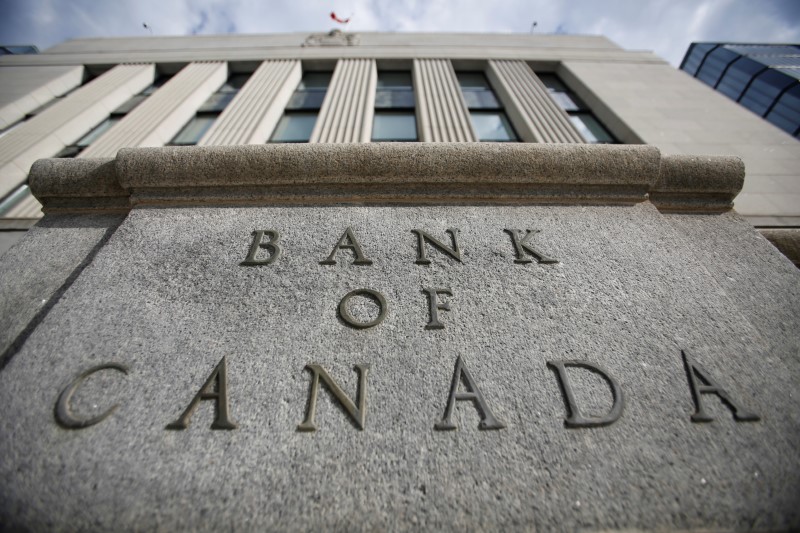Canadians brace for higher interest rates after years of cheap debt
Reuters | Jul 09, 2017 03:30PM ET
Be the first to comment

By Leah Schnurr
OTTAWA (Reuters) - After years of debt-happy Canadians being warned that borrowing costs would have to rise eventually, they may be about to face a reckoning if the Bank of Canada hikes interest rates next week, as many expect.
Canada's likely "lift off" on Wednesday - which would bring the country's first interest rate increase in nearly seven years - comes at a time when the economy still faces a number of headwinds, including weak inflation and the expected renegotiation of the North American Free Trade Agreement (NAFTA).
But with the economy and labor markets growing, the Bank of Canada began laying the groundwork for hikes with a sharp shift in tone last month. Markets are pricing in more than 90 percent odds of a quarter-percentage point increase on July 12, while a second hike is expected by the end of the year.
Economists in a Reuters poll were more divided on whether the bank would move next week, with the median forecast pointing to a hike in the fourth quarter. [CA/POLL]
Cindy Fuailefau is six months into a debt repayment plan after she accumulated more than C$41,000 ($31,847) in debt and was unable to keep up the payments after her husband stopped working due to a back injury.
"That was all just trying to live, not vacations or anything," the 56-year-old said.
Canadians as a whole owe C$1.67 for every dollar of income, a near record high. TransUnion said in a report last year that more than 700,000 consumers would struggle with even a quarter-point hike in interest rates.
Where the average person seeking help 20 years ago owed about C$12,000, now it is not uncommon to see people with C$100,000 in unsecured debt, said Scott Hannah, president of the Credit Counseling Society.
"We've just become very comfortable over the past decade carrying debt," Hannah said. "No one is paying attention because ... rates have remained low."
ALREADY FEELING THE PAIN
Canadians may already be feeling a squeeze.
Canada's 5-year yield has soared more than 50 basis points to 1.47 percent since hawkish comments from top Bank of Canada officials last month. Royal Bank of Canada (TO:RY), the country's biggest bank, has already raised rates on fixed-term mortgages ahead of the central bank announcement. Mortgage rates are typically based on 5-year bonds.
That is an important signal to Canadian households that their situation may be about to change, said Frances Donald, senior economist at Manulife Asset Management.
"It also, critically, implies that the economy is already going to feel higher interest rates, even if the Bank of Canada holds (on) Wednesday," Donald said.
While a 50-basis point increase would still leave rates at a relatively low 1 percent, it could be enough to prolong the recent cooling in the Vancouver and Toronto housing markets. It could also slow demand in cities that have not seen the same rapid price increases and are therefore more interest rate sensitive, such as Ottawa and Montreal.
"On the lower end of the market, entry level product may be impacted a little bit more because they're a bit more sensitive to those rate hikes," said Adil Dinani, Royal LePage realtor in Vancouver.
The biggest question of all remains whether the Bank of Canada plans to stop after two rate hikes, thereby removing the stimulus it added in 2015, or whether it is embarking on a longer tightening cycle.
"If this is the beginning of a tightening cycle that will persist for several years, that will have a pronounced impact on homebuyers, business investors and general households," said Donald.
But for those who were able to get ahead of the curve and pay down debts, the potential higher interest rates will be more bearable.
Over four years ago, Charis Sweet-Speiss found herself laden with C$67,000 in debt across 13 credit cards as she struggled to meet mortgage payments on her British Columbia's Okanagan Valley house despite the low rates.
Now, Sweet-Speiss, who is on a repayment plan, plans to finish paying the last of her credit card debt in August, and hopes to have her house, and the line of credit she borrowed against it, paid off in three years so she can retire.
"The rates now, I've heard they're going up, and I am so grateful I'm not in that situation any more."
($1 = $1.2877 Canadian)
Written By: Reuters
